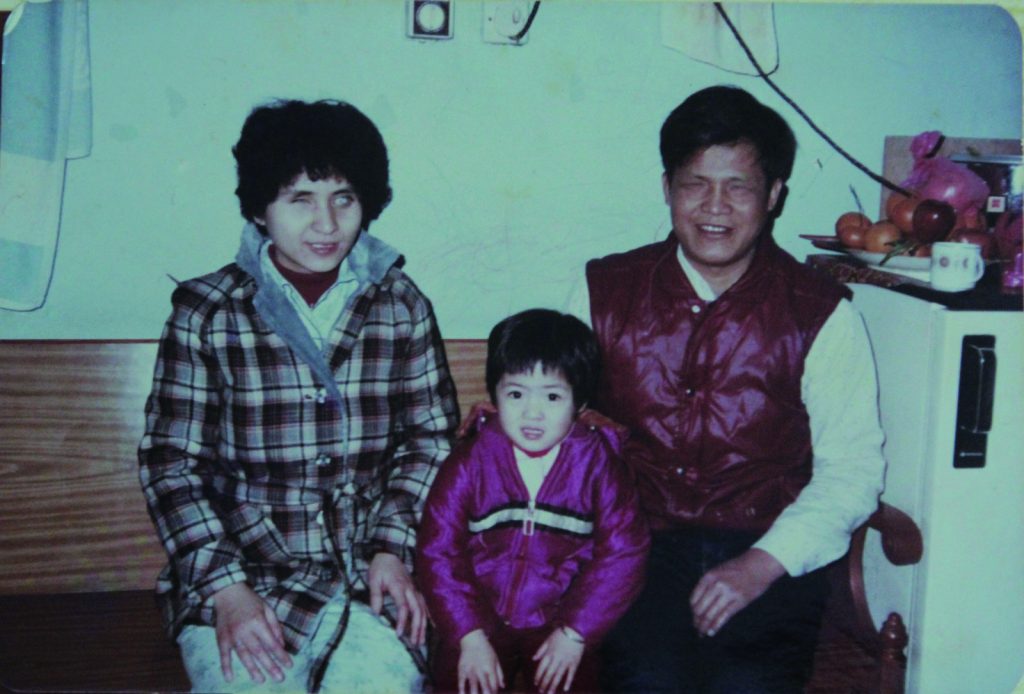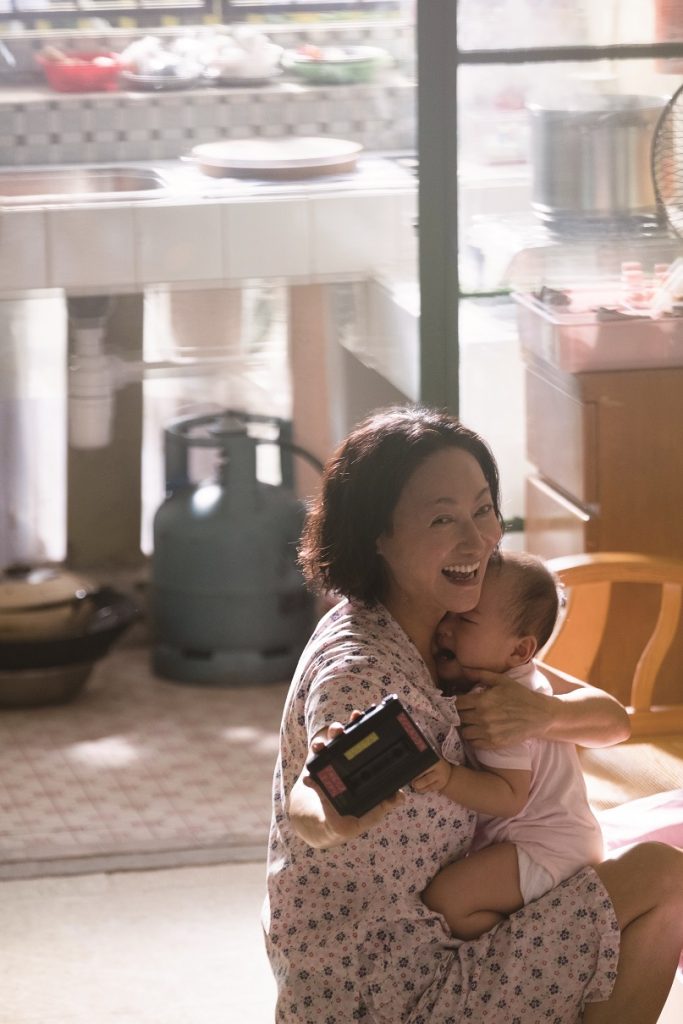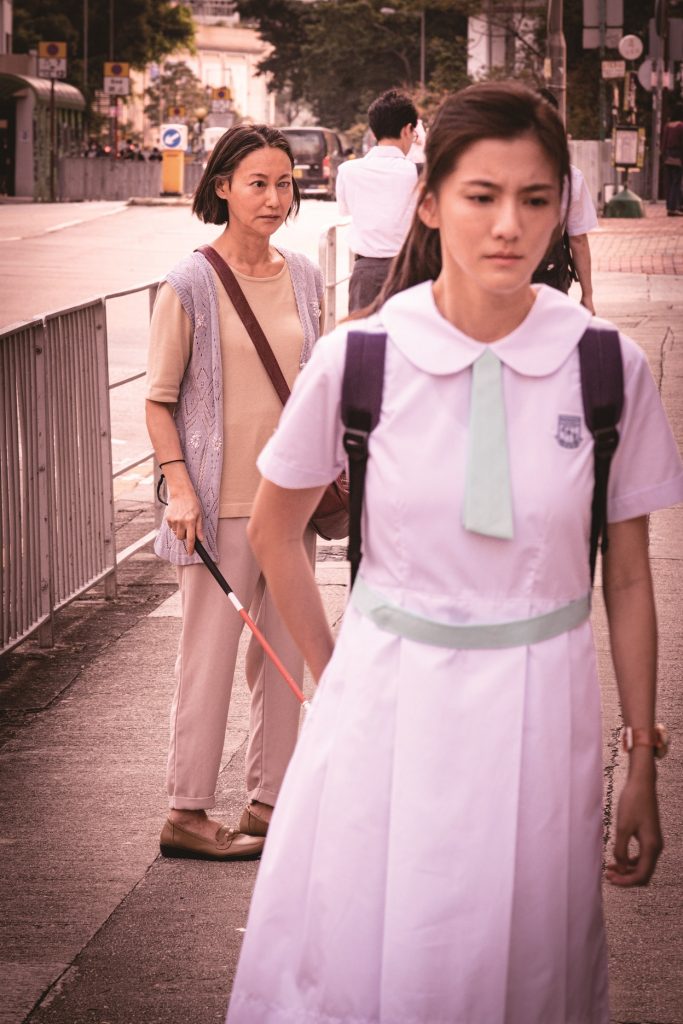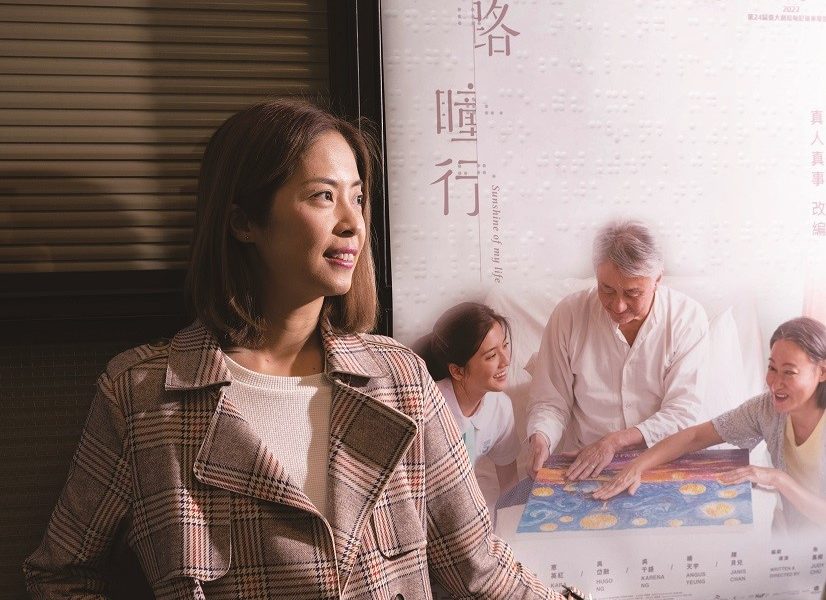Judy Chu had once thought that her visually impairedparents had only brought her into the world so she could act as their eyes. She had tried to break free from her family until she learnt the truth when she was making the movie “Sunshine of My Life”. Her mother said, “Many have questioned why I decided to give birth to Judy – I wanted to show her how beautiful the world is.”
A struggling parent-child relationship
After graduating from the Hong Kong Academy of Performing Arts (HKAPA) as a performance major, Judy was a freelance artist for a decade, playing a part in stories written by others. She soon moved into screenwriting. Her novel “I Sell Love” was made into a movie, in which she volunteered to be the screenwriter as well. Inspired by her grandmother’s life story, she wrote the play “Farewell the Good Old Days” which was nominated for the Golden Horse Film Project Promotion (FPP) in the Taipei Golden Horse Film Festival 2014, and the Best Playwright at the 25th Hong Kong Drama Awards. “Farewell the Good Old Days” also took home the Moneff Award and became the first major milestone in Judy’s career as a screenwriter.
A story about Judy and her parents, “Sunshine of My Life” reveals Judy’s most private and personal thoughts. She spent 10 years working on the script and collected audience feedback through reader’s theatre performances and a self-directed 15-minute short film starring her parents. “I originally wanted to express my own emotions through this film. Little did I expect that the audience to be interested in knowing more about my parents and the difficulties they faced when raising me.
I had never looked at my unique family from an outsider’s perspective. The audience’s response had inspired me that the movie would touch many more hearts if it spotlighted my parents’ lives and points of view.” After knocking on many movie companies’ doors, Judy was eventually successful in engaging Mandarin Motion Pictures Ltd as an investor. The movie began shooting in 2020 and was released this September.
A unique childhood
While many may assume Judy’s family to be dependent on government aid as both her parents are visually impaired, her father had a job that could support the family of three. Nevertheless, her childhood was one of a kind. “I rarely went to the park as my parents feared I would be abducted. My father built me a wooden slide and hung it on our bunk bed. To create a smooth surface, he sanded the wood and sometimes even poured baby powder on it to reduce friction. I remember having so much fun on that slide.” Parents nowadays record every milestone in their children’s life with photos and videos; yet, Judy has few childhood pictures that were only taken when her relatives visited. “My mother had a tiny recorder to chronicle my childhood milestones such as my first words. She would share these recordings with the family during mealtimes.”
When Judy was little, she was very close to her parents. She wished for her parents to regain their eyesight every year on her birthday. She often stood up for her parents too. “One time in an elevator, a kid asked his parents what had happened to my mum’s and dad’s eyes. To my surprise, the parents answered, ‘They watched too much TV! Do not
watch so much TV or you will end up like them!’ I was furious and looked daggers at them, yet my parents were completely unbothered. My mum told me, ‘As long as you know the truth, what others say does not matter. We are not offended at all.’” Judy applauses her mother’s wisdom and her father’s sense of humour. Her mum can always tackle challenges head-on wisely; her dad, on the other hand, brightened up every room he entered. While others may think Judy is the caretaker of the family, she was the one who flourished under her parents’ wing as they tackled countless difficulties especially when she was a newborn and toddler.

Parenting without sight
Judy’s parents both lost their eyesight due to a high fever when they were only three to four years old, therefore, they were especially worried whenever Judy caught a fever. “One time, my parents took me to our family doctor in Mong Kok to have my fever treated. Facilities for the visually impaired, such as the traffic light sound signals, were not so common in the 1980s. My parents only knew places we frequented such as my kindergarten, the wet market and their workplaces, so for them to travel to Mong Kok on their own was an impressive deed. When we got home, they used rubber bands to mark my medicine dosage and fed it to me accordingly. My mum keeps a tidy and organized space at home as well.”
During the filming of “Sunshine of My Life”, Judy’s mum revealed to her a story she had never heard before. “My mother once put me on the baby walker and went into the kitchen. Suddenly, she heard a loud noise from the living room – I had accidentally tripped on the electric wire of the rice cooker, causing it to fall from the top of the refrigerator. When my mother came out of the kitchen, she slipped on the hot congee that was then spilt onto the floor. After a long silence, I finally cried. Fortunately, I was not burned by the hot congee. My mother told me, ‘I do not know what I would have done if you had been burned!’ She had kept the incident from me all these years out of guilt.” Blind parents face the same obstacles that all parents do in parenthood. They, too, worry when their children get sick, fall or injure themselves but must deal with these challenges with even more wisdom, patience and independent willpower than able-bodied parents. Only years later did Judy learn that empathy is the glue to a family.

Mother-daughter conflicts
Mother-daughter relationships are often complicated, even conflicting, as females’ innate sensitivity and emotions tuck them away from each other. When Judy was in secondary school, her relationship with her mum took a downturn as she, like many teenagers, often responded with rejection on her mother’s efforts in getting close to her. “Since
kindergarten, my mother would touch me from head to toe to make sure I was ready to head out. While I had been used to it as a child, her touch began to feel intrusive in secondary school. The way my mother would check if I had my ears pierced or if I was wearing a short skirt made me feel like I was in prison.” In her rebellious years, Judy kept to herself and even said regretful things she did not mean to her mum. After numerous fights, their relationship was at a landslide.
“Sunshine of My Life” retold some anecdotes from Judy’s life. One time, Judy’s mother wanted to pick her up from school but ended up being ignored by her daughter. “While my parents have come to terms with their blindness, I was too self-conscious to share this part of my life with the world. Adolescence is a time of self-image development – I was too scared to tarnish the image I had built for myself.” Understanding what was on Judy’s mind, her mother concealed her own sadness. Even when Judy ran away from home, her mother was the first one to apologize.
“No matter how sad or disappointed they are, mothers always forgive their children.” Judy regrets overlooking her parents’ strengths and thinking she was superior just because of her eyesight. “My arrogance had blinded me from my parents’ undue contributions to the family,” Judy says.
Albeit the occasional quarrels, a mother knows her daughter best. Her mother’s wisdom and unconditional support have made Judy who she is today. “After learning about my passion for art and performing, my parents encouraged me to apply for HKAPA. I was hesitant and feared failure; my mother, on the other hand, is never afraid to test her limits: after all, she once ran a marathon in Taiwan and is an avid swimmer. She believes we should try different things
to truly know what destiny has in line for us. She told me, ‘There is no easy feat in any job anyway; you should choose something you enjoy rather than forcing yourself to do what you hate for the money.’” Judy appreciates that her mother never judges her by society’s standards but instead showers her with trust and encouragement. “As my parents do not conform to social norms themselves, they did not focus on teaching me academic or technical skills but core virtues that will truly benefit me for a lifetime.”

ignored her mother.
Creating is self-therapeutic. In “Sunshine of My Life”, Judy dissected her past experiences and admitted to considering leaving her parents behind for a life of freedom. It was not until four or five years ago when her father was diagnosed with cancer that she finally realizedher time with her parents was finite. Her father passed away before filming began. Judy admits, “Many, including myself, may have neglected their family. We also tend to be impatient and selfish towards our family members. I have finally realized that family is the only thing that matters in our lives. Despite the ugliest quarrels and contrasting values, they are still your family at the end of the day. I used to think I could start a new chapter without my parents, yet the influences of my family will follow me for the rest of my life. Only by healing from our family traumas and accepting our family as a safe haven could we move forward in life.” After foraying out into the big world, Judy finally learnt how much she missed home despite its imperfections.

